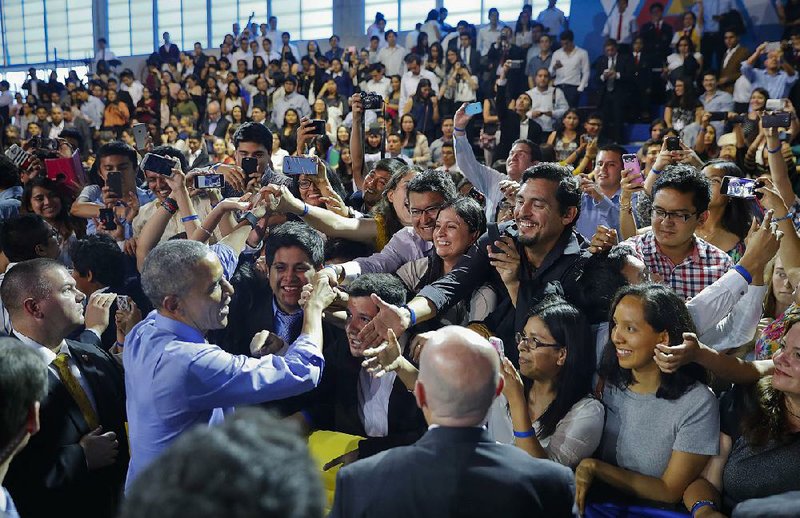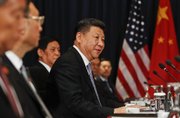LIMA, Peru -- Warning against a rush to judgment, President Barack Obama sought Saturday to ease concerns in Latin America that President-elect Donald Trump will wipe out trade deals and create other international problems.
"Don't just assume the worst," he said. "Wait until the administration's in place."
Obama, speaking on the margins of the Asia-Pacific Economic Cooperation Forum in Peru, said tensions over trade are likely under the new Trump administration, and trade pacts may be modified. But he predicted that once the administration sees how the deals are working, "they'll determine that it's actually good both for the United States and our trading partners."
Obama made his comments during a town-hall-style forum with young people after meeting with leaders of countries that joined the U.S. to negotiate a sweeping Pacific trade deal that is now in jeopardy.
The president said his meetings in Peru were a good chance for leaders to review how to spur their economies. They had hoped to achieve some of those goals through the Trans-Pacific Partnership, but the agreement appears unlikely to be ratified because of opposition from Trump. Trump opposes multinational trade deals as written, saying they are harmful to U.S. workers.
Obama pressed leaders of the other 11 countries in the Pacific agreement to "find ways to ensure that trade agreements contribute to our shared objective of reducing inequality," according to a White House statement. The president also urged them to keep working to advance the imperiled deal.
Of the summit overall, Obama said "this is always a useful occasion for us to get together and examine how we can make sure that we're creating more jobs, more opportunity and greater prosperity for all of our countries."
Obama supports trade deals as a way to boost U.S. exports and create American jobs.
Mexican President Enrique Pena Nieto defended his country's trade relationship with the U.S., but he took a cautious approach to Trump's pledge to renegotiate the North American Free Trade Agreement, which Pena Nieto said benefits workers and companies on both sides of the border in a bilateral trade relationship responsible for moving $1 million worth of goods every minute.
"In the face of Trump's positioning, we're now in a stage of favoring dialogue as a way to build a new agenda in our bilateral relationship," said Pena Nieto, whose country participates in NAFTA with the U.S. and Canada. "Mexico, like the entire world, is about to initiate a new stage with the U.S., and in commercial terms we want to give the right value to this strategic relationship between Mexico and the U.S."
New Zealand's Prime Minister John Key spoke more bluntly, saying the "tremendous despair" triggered by Trump's trade views can't be allowed to slow down economic integration by the rest of the world.
"Even if the United States doesn't want to engage in free trade, President Trump needs to know other countries do," said Key.
He said it's still possible to save the 12-nation Trans-Pacific Partnership negotiated by the Obama administration by introducing cosmetic changes making it acceptable to Trump, or by carving out a less ambitious pact among Trans-Pacific Partnership signatories that leaves out the U.S.
"I personally think that President Trump will be very much like chairman of the corporation Trump is," he said. "He's a flexible business guy. He's going to realize he has a role to play."
China's plea
In his kickoff speech from Peru on Saturday, Chinese President Xi Jinping made an impassioned call against protectionism, saying the best response would be for the 21 members of the Asia-Pacific Economic Cooperation Forum to negotiate a free trade area encompassing the entire Pacific Rim.
"Closed and inclusive arrangements are not the right choice," Xi said -- a remark interpreted as criticism of the Trans-Pacific Partnership, which excludes China and which many Chinese see as an attempt to reassert U.S. dominance in Asia. "Building a free trade area of the Asia-Pacific is a strategic initiative critical for long-term prosperity."
Chinese state media criticized Trump for opposing trade agreements, saying his policies could drag the world into "deeper economic distress."
"The billionaire-turned-politician needs to prove that derailing the global economy has not been one of the reasons why he ran for U.S. president," the official Xinhua news agency said in a commentary piece published Saturday.
Philippine President Rodrigo Duterte met with Xi on the sidelines of the forum, and he promised his Chinese counterpart that he will align his foreign policy toward China-led Asian economic development, further reinforcing his shift toward China amid his hostile stance toward the U.S.
Duterte first met Xi in a state visit to China last month, where their governments forged mostly trade and economic accords. They also discussed longstanding territorial disputes in the South China Sea. After his China trip, Filipinos were allowed back to fish in the disputed Scarborough Shoal, which Chinese coast guard vessels have guarded since seizing the rich fishing area in 2012.
In their meeting in Lima, Duterte told Xi that "we will cooperate with you."
He added, "With my thrust of an independent foreign policy, we will find ourselves mutually agreeing in so many things and align our foreign policy towards the development of Asia, strengthening of ties among the countries in the region, with China leading the way in the economic development."
Duterte also talked at the forum with Russian leader Vladimir Putin, whom he has called his political idol.
Elsewhere at the forum, the founder and chief executive officer of Facebook urged world leaders to help get more people online to improve global living standards.
Mark Zuckerberg lamented that half of the world has no access to the online world and is being deprived of its economic potential as well as advances in science, education and medicine. He urged leaders to work with his company and others to close that gap.
"If we can connect the 4 billion people who aren't connected, we can lift hundreds of millions of people out of poverty," Zuckerberg said in his address. He met with Peruvian President Pedro Pablo Kuczynski and promised to help Peru boost Internet connectivity in far-flung, rural parts of the South American country.
But as Zuckerberg was promoting the benefits of the online world in the speech, he took to his Facebook page to address one of the downsides of the Internet: the rapid dissemination of bogus news stories on social networks.
Zuckerberg said in a post late Friday that his company was taking measures to curb what he said was a "relatively small" percentage of deliberately false stories. The measures include developing new tools to detect and classify "misinformation" and to make it easier for users to report the material.
He said the company also is looking into the possibility of working with established fact-checking organizations to evaluate content and into the feasibility of warning labels for stories flagged as false.
Facebook said Monday that it was clarifying its advertising policy to emphasize that it won't display ads -- thus cutting revenue -- for sites that run information that is "illegal, misleading or deceptive, which includes fake news." That followed a similar step by Google, which acknowledged that it had let a false article about the election results slip into its list of recommended news stories.
"The bottom line is: we take misinformation seriously," the Facebook CEO said in his post. "Our goal is to connect people with the stories they find most meaningful, and we know people want accurate information."
Zuckerberg called the problem "complex, both technically and philosophically." It is also a sensitive issue for a company that does not want to censor content such as legitimate political satire that some people find offensive. Facebook sees itself not as a traditional publisher, but as a facilitator of global communication.
The Facebook CEO said investment in such infrastructure is necessary to address the gap between rich and poor that has become a source of rising anxiety. "As we are learning this year in election after election, even if globalization might grow the overall pie of prosperity, it also creates inequality," he said. "It helps some people, and it hurts others."
Investing in "connectivity," he said, can address some of the consequences of globalization. "We can disconnect, risk less prosperity and hope jobs that are lost come back. Or we can connect more, try to do more great things, try to work on even greater prosperity and then work to aggressively share that prosperity with everyone."
President Tran Dai Quang of Vietnam closed the forum on Saturday by inviting world leaders to his Southeast Asian nation in 2017 for the next meeting of the forum's 21 nations.
The leaders and representatives at the forum were expected to spend today in bilateral meetings and closed sessions.
Information for this article was contributed by Darlene Superville, Ben Fox, Joshua Goodman, Josh Lederman, Franklin Briceno, Calvin Woodward, Nancy Benac, Kevin Freking and Paul Traynor of The Associated Press.
A Section on 11/20/2016


